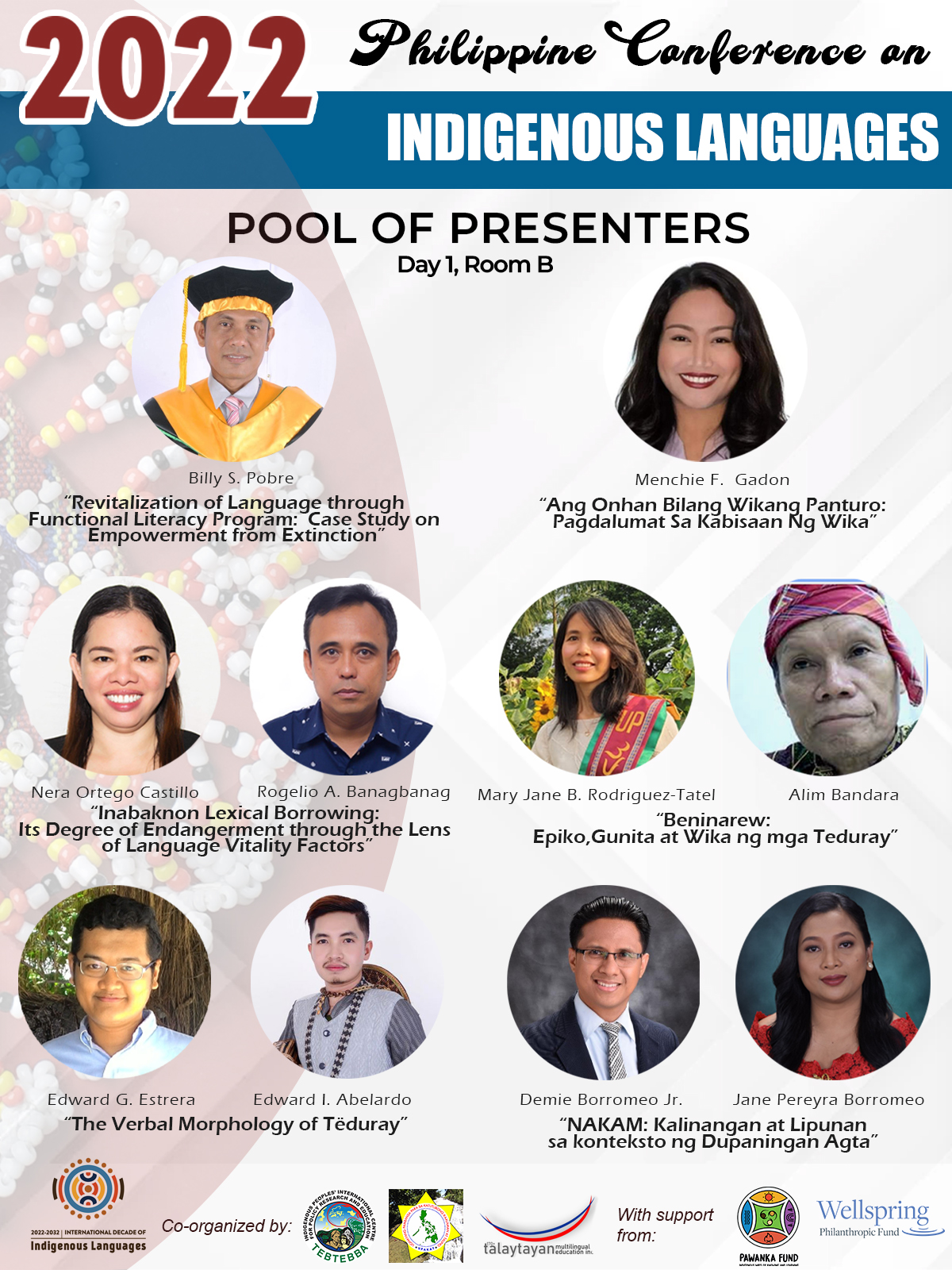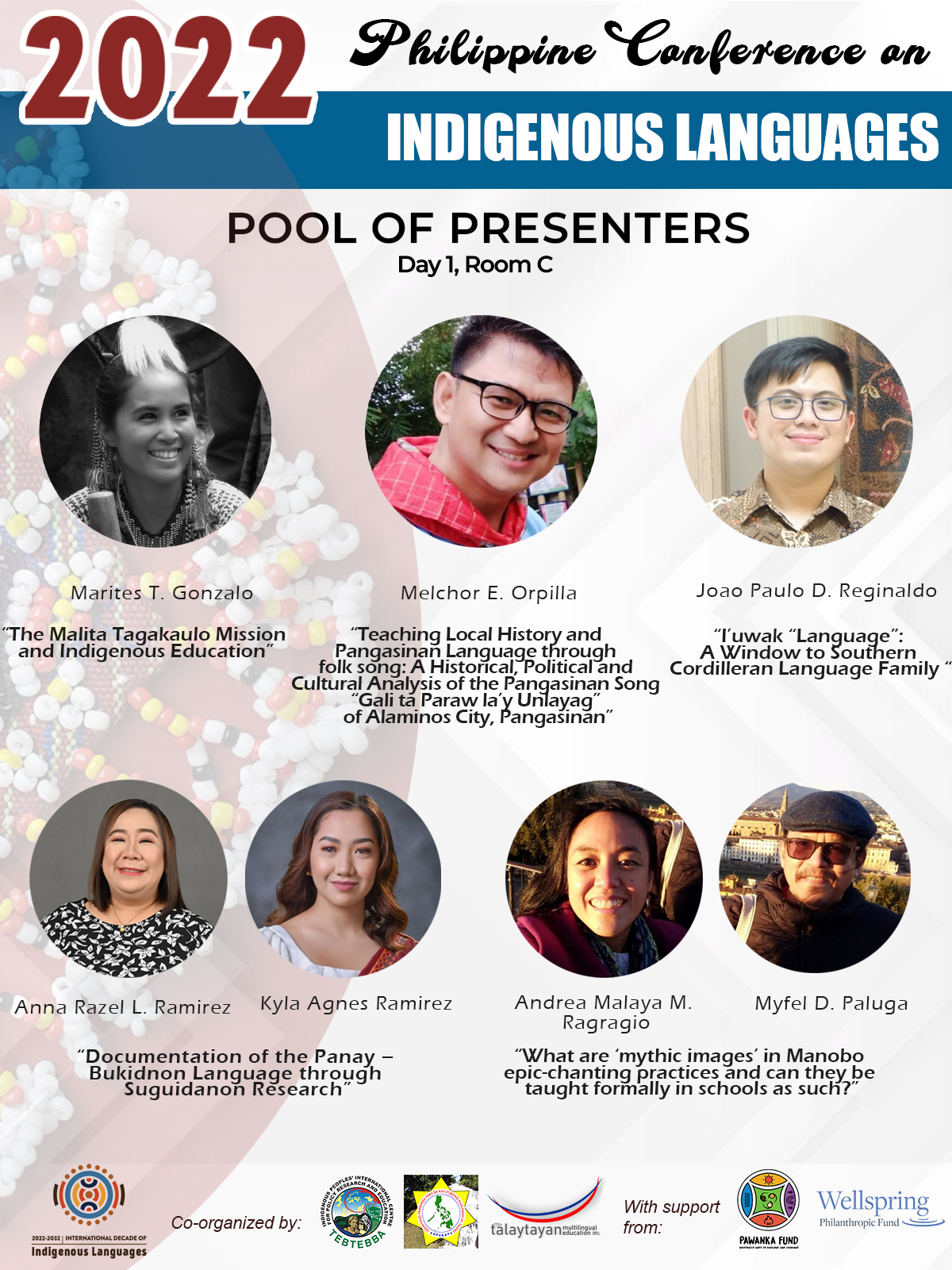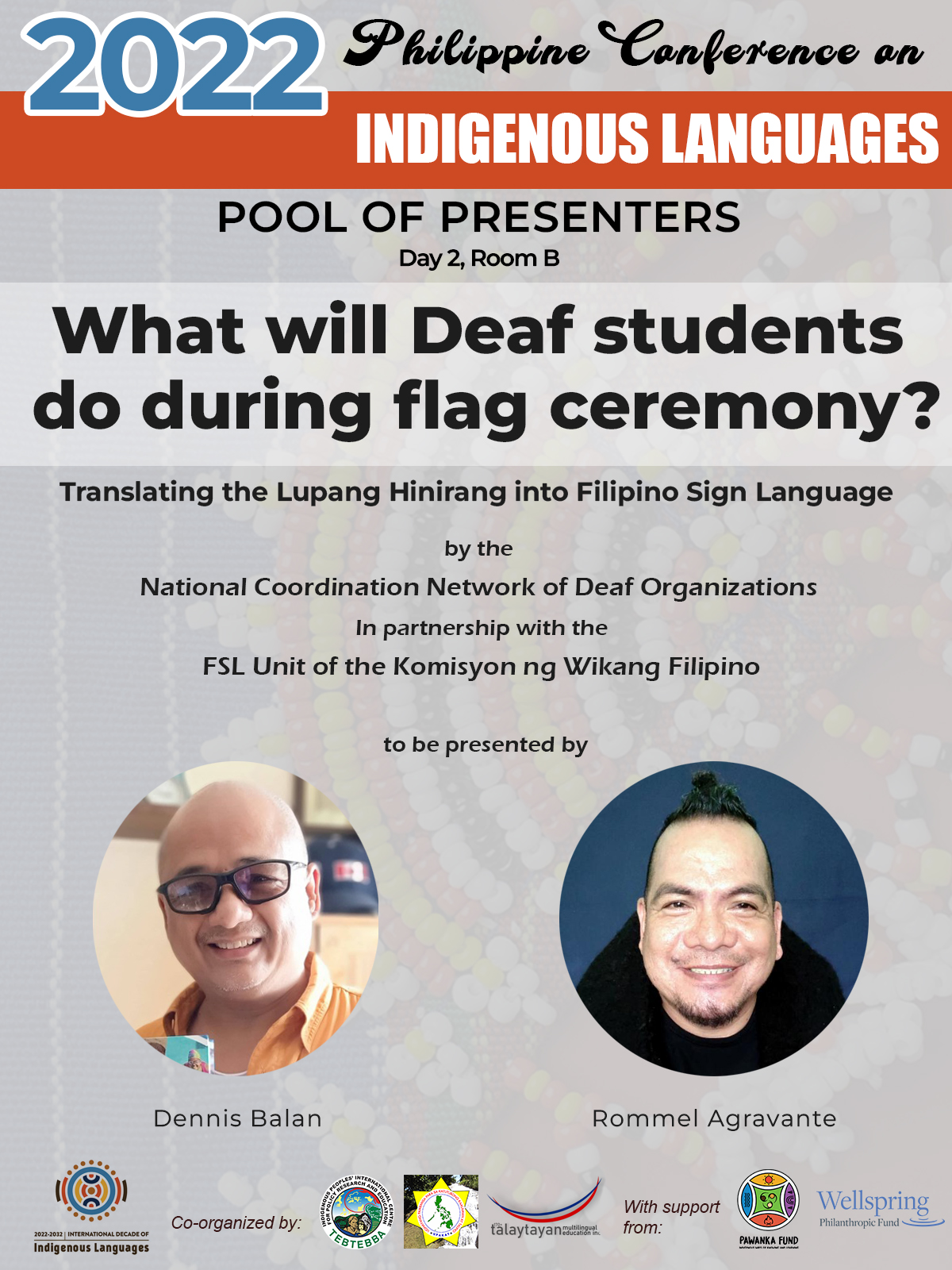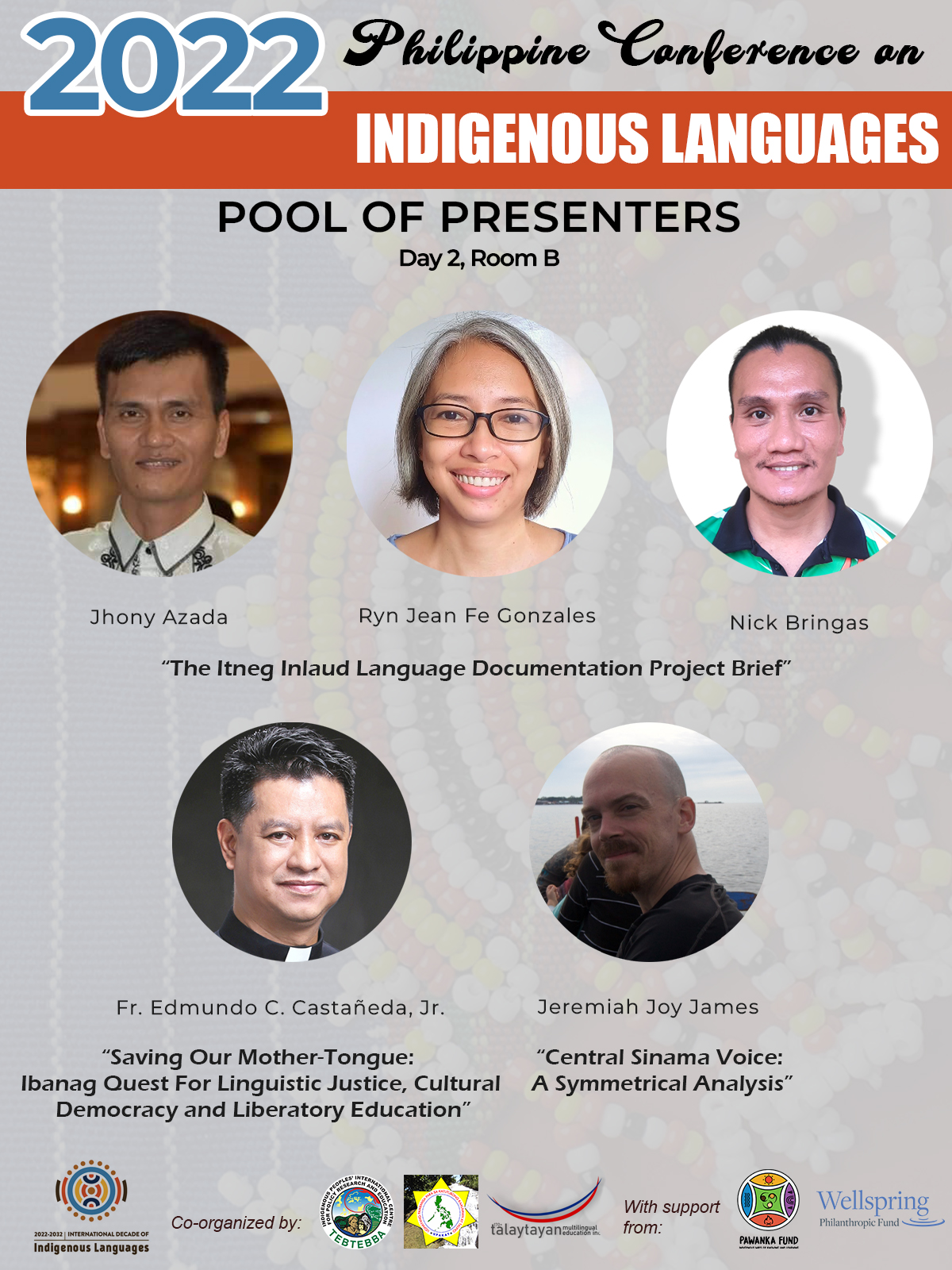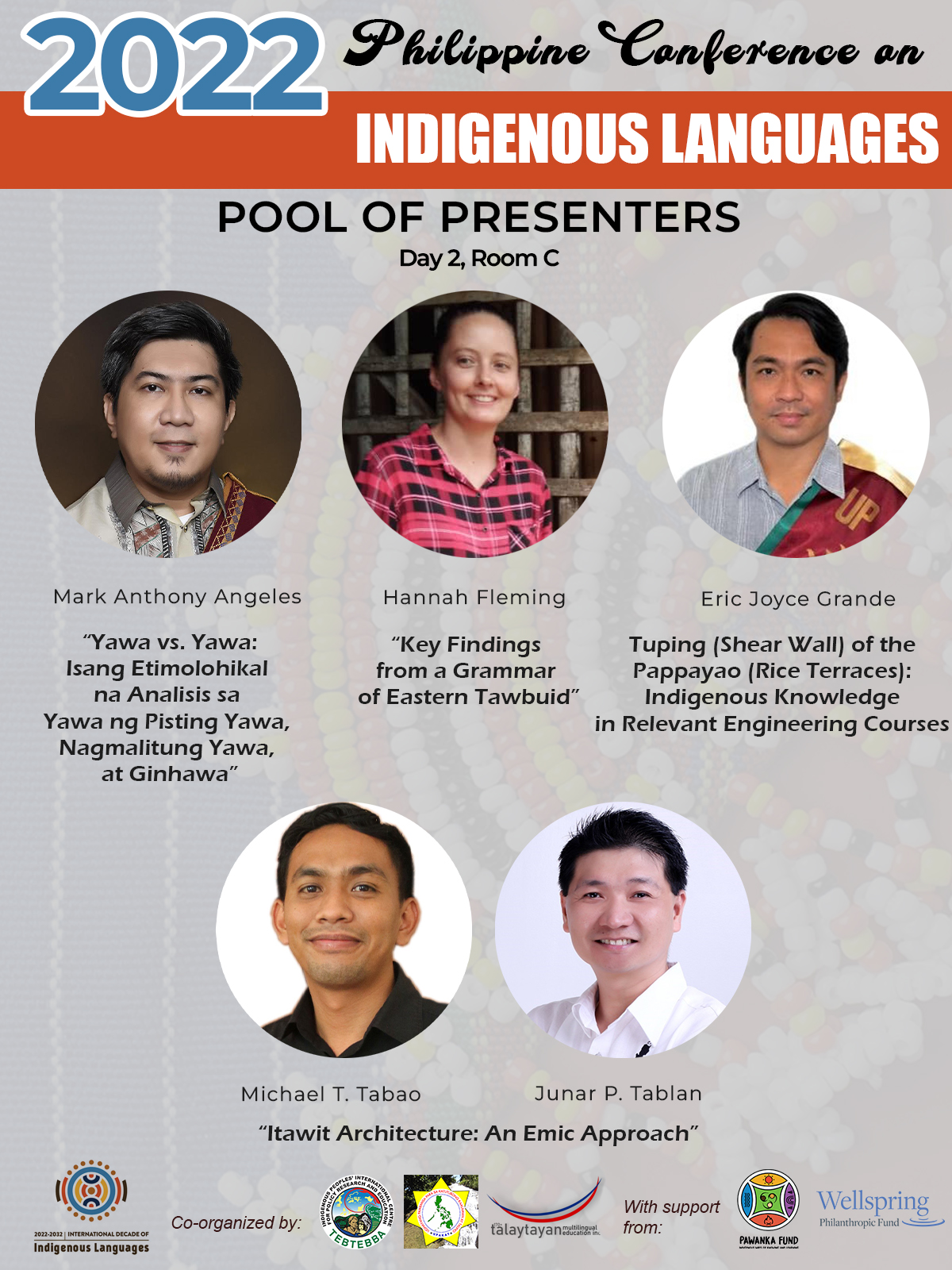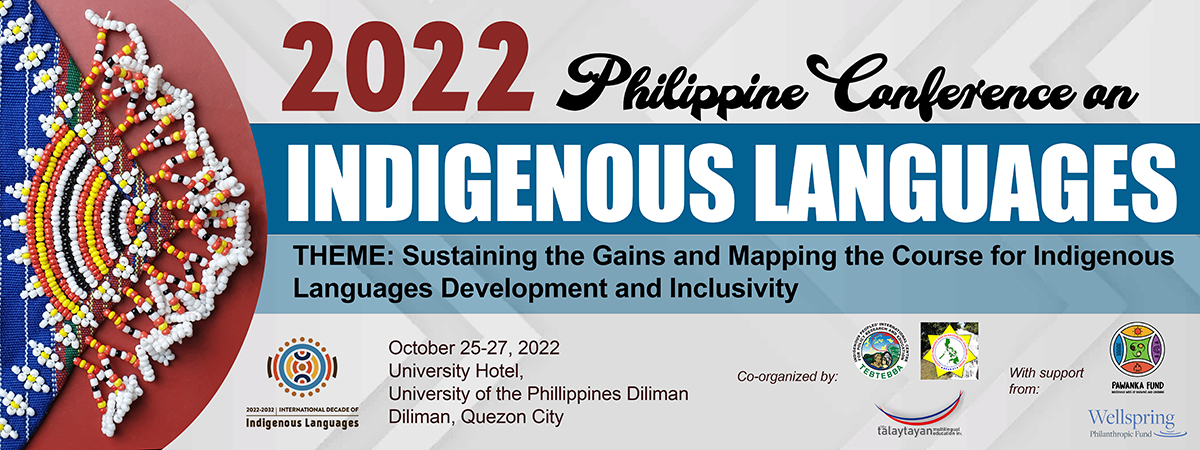
As a response to the International Decade on Indigenous Languages (2022-2032), Tebtebba Foundation (Indigenous Peoples’ International Centre for Policy Research and Education) will hold the Philippine Conference on Indigenous Languages on October 25-27, 2022 at the University of the Philippines Hotel in Diliman, Quezon City, Philippines.
RATIONALE:
The International Decade on Indigenous Languages (IDIL) Global Action Plan in pursuit of the goal of “Leaving no one behind, No one outside” by 2032 has called on UN-system entities, governments, Indigenous Peoples’ institutions and organizations, including communities at the grassroots, broader civil society, academia, the private sector, and other stakeholders to achieve the major objectives of the Decade. This conference is a response of indigenous peoples’ organizations in the Philippines and partners to this call to action.
The theme of the national conference is “SUSTAINING THE GAINS AND MAPPING THE COURSE FOR INDIGENOUS LANGUAGES DEVELOPMENT AND INCLUSIVITY”
OBJECTIVES:
The conference aims to:
- raise and deepen awareness of participants on the goals and objectives of IDIL;
- exchange information on the current state of the indigenous languages of the Philippines and the extent of their use in education and official functions;
- draw concrete plans, in the short- and long-term, in pursuit of the global plan, which shall include a country declaration to be shared with UNESCO and other relevant bodies;
- promote cooperation, forge linkages and form a preparatory committee that can oversee the enrichment and implementation of those plans; and
- document, consolidate and publish the proceedings of this conference.
ORGANIZERS:
 TEBTEBBA FOUNDATION (Indigenous Peoples’ International Centre for Policy Research and Education)
TEBTEBBA FOUNDATION (Indigenous Peoples’ International Centre for Policy Research and Education)
An indigenous peoples’ organization based in Baguio City, Philippines. It is a research, education and policy advocacy and resource center working with indigenous peoples at all levels. It seeks the recognition of indigenous peoples’ rights and aspirations while building unions to uphold social and environmental justice and sustainability.
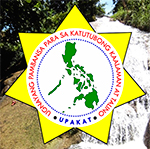 Ugnayang Pambansa para sa Katutubong Kaalaman at Talino (UPAKKAT)
Ugnayang Pambansa para sa Katutubong Kaalaman at Talino (UPAKKAT)
The Ugnayang Pambansa para sa Katutubong Kaalaman at Talino (a national network of indigenous political structures, indigenous peoples’ organizations and indigenous communities for the promotion of traditional/indigenous knowledge and wisdom, UPAKAT Inc.) was formed to strengthen the protection, promotion, collective practice, , innovation and transmission of indigenous knowledge systems and practices to the next generation.
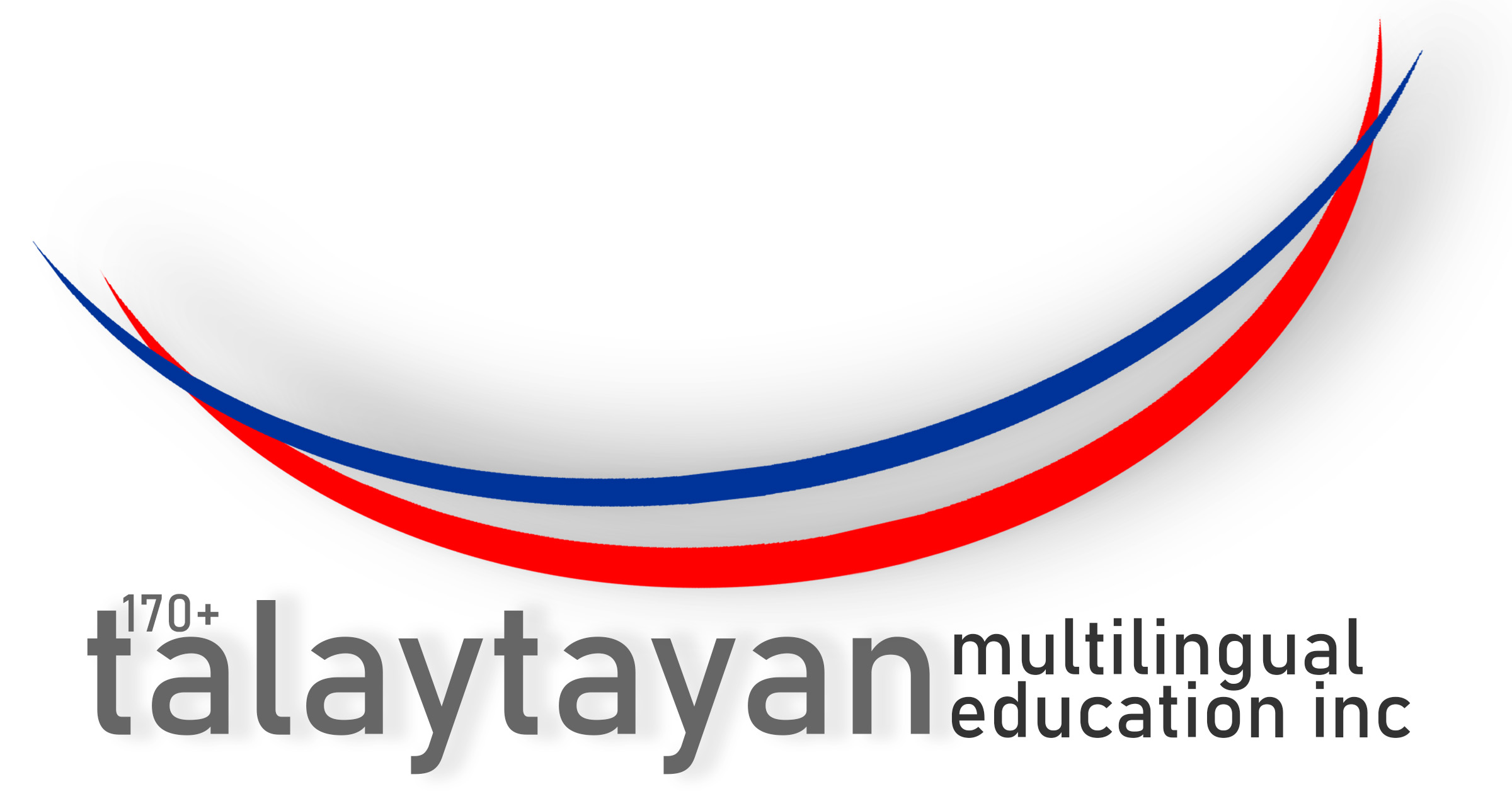 170+ TALAYTAYAN MLE INC.
170+ TALAYTAYAN MLE INC.
A non-profit organization that promotes Mother Tongue Based Multilingual Education (MTBMLE) through advocacy building, policy development, teachers training and education, and materials development.
INVITED STAKEHOLDERS:
Invited to this meeting are the following: (a) Indigenous peoples’ organizations and networks; (b) Department of Education and Commission on Higher Education, especially those involved in IPED education; (c) UNESCO National Commission of the Philippines (UNACOM); (d) National Commission for Culture and the Arts (NCCA); (e) National Commission on Indigenous Peoples (NCIP); (f) Komisyon sa Wikang Filipino (KWF); (g) academic institutions with programs catering to indigenous peoples; and (h) NGOs.
PROGRAM:
2022 PHILIPPINE CONFERENCE ON INDIGENOUS LANGUAGES
October 25-27, 2022,
University Hotel, University of the Philippines-Diliman, Quezon City
PROGRAM
Day 1, October 25, Tuesday
Morning Session
7:00-7:30 Breakfast
7:30- 8:00 Registration
8:00-8:15 Preliminaries/National Anthem/Invocation
8:15-8:30 Introduction of Participants and Guests
8:30-8:50 Opening address (The IDIL Global Action Plan, IDIL Task Force, Paris)
8:50-9:00 Message(s) from IP leaders and Elders
9:00-9:30 Keynote Speech (Vicky Tauli-Corpuz, TEBTEBBA Foundation)
9:30-10:00 Messages: (a) UNESCO IDIL Global Task Force/Steering Committee, (b) UNACOM OIC Lindsay Barrientos, Deputy Executive Director
10:00-10:20 Coffee break
10:20-10:45 The state of health of the indigenous languages of the world and of the Philippines (Ricardo Ma. Duran Nolasco and Rynj Gonzales)
10:45-12:00 PANEL DISCUSSION:
(a) The education provision under Philippine laws for indigenous peoples: expanding and ensuring inclusivity of the curriculum space (Maria Lorie Victor, IPSEO, Department of Education)
(b) Current plans of Philippine cultural agencies relative to indigenous people’s education and heritage preservation (Felipe Mendoza De Leon Jr., Former Chair, National Commission for Culture and the Arts)
(c) Programs for IP education and research of the NCIP (Allen Capuyan [NCIP Chair])
(d) Ang Mahigpit na mga Tungkulin ng Komisyon sa Wikang Filipino sa Dekada ng mga Katutubong Wika (Arthur P. Casanova, Tagapangulo, Komisyon sa Wikang Filipino)
12:00-1:20 Lunch
Afternoon Session
1:20-1:30 Instructions for the break-out sessions
1:30-2:10 Breakout sessions shall elaborate on the IDIL global action plan and shall cover one of four interlinked outcomes of the global plan. Each group is expected to identify the areal priorities, output, activities, target stakeholders, collaborating partners and needed resources.
2:10-2:40 Reports and presentations of the break-out sessions
2:40-3:00 Coffee break
3:00-5:00 Parallel Presentations
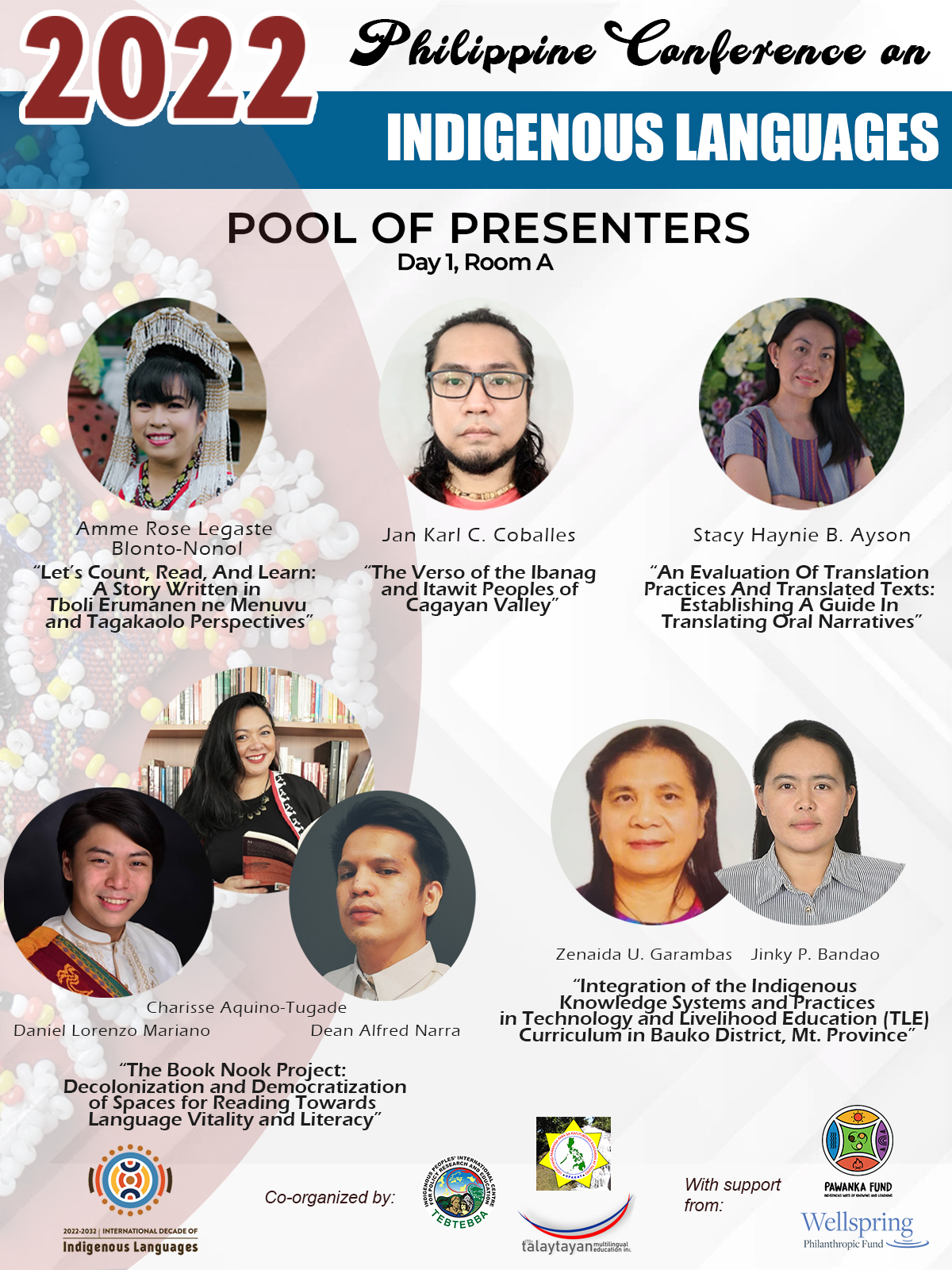
2022 Philippine Conference on Indigenous Languages; A Response to the International Decade of Indigenous Languages (2022-2032)
Meet the Room A presenters for the contribution to the preservation and promotion of indigenous languages.
Amme Rose Blonto - Nonol, belongs to the cultural group of #Tboli residing at Tboli Village, Poblacion, Lake Sebu. She is a graduate of Master of Arts in Language Teaching at USM, Kabacan, Cotabato and currently taking her PhD in Educational Management at NDMU, Koronadal City.
Jan Karl Jake Calubāquib Coballes, an #Ibanag from Tuguegarao City, Cagayan, graduated with a bachelor’s degree in Journalism at the University of the Philippines and is currently finishing his master’s degree in #Anthropology in the same institution. His various researches involve Ibanag culture, language, and ethno-history, some of which were published and presented in diverse conferences and online media.
Stacy Haynie B. Ayson, faculty member of the Bachelor of Arts in English Language program of the School of Teacher Education and Liberal Arts, University of Baguio. She earned her PhD in Language from Benguet State University. Her research interests include local language and culture, literature, and English Language Teaching.
Charisse Aquino Tugade, the Executive Director of the National Book Development Board - Philippines (NBDB), primary mover for CulturAid, founder of The Manila Collectible Co., and founding Director of Museo ng Muntinlupa.
Daniel Lorenzo Mariano, works as a Project Development Officer II assigned for The Book Nook Project of the National Book Development Board.
Dean Alfred Narra, currently a Project Development Officer at the National Book Development Board where he assists on programs such as Translation Subsidy, Publication Grant, and International Fairs.
Zenaida Ulpindo Garambas, currently works as a research officer in Tebtebba Foundation; taught General Physics, Mathematics, Statistics, and Research at Saint Louis University, Baguio City. Has published two books, one in Basic Statistics and the other in Mathematics in the Modern World.
Jinky L. Pasian-Bandao, a secondary school teacher at Leseb National High School, Leseb, Bauko, Mountain Province teaching Technology and Livelihood Education (#TLE) in junior high school.
5:00 End of Session for the 1st Day
6:00 Dinner
7:00 Film showing
Day 2, October 26, Wednesday
Morning Session
7:00-8:00 Breakfast
8:00-8:15 Summary of the 1st Day’s Session
8:15-8:45 Asserting the rights of indigenous peoples to their culture and languages (Atty. Jennifer Corpuz, Policy Director, Nia Tero)
8:45-8:55 Reactor 1 (IP representative-Luzon)
8:55-9:05 Reactor 2 (IP representative-Mindanao)
9:05-9:15 Reactor 3 (IP representative-Visayas)
9:15-9:40 Round-Table Discussion
9:40-10:00 Coffee Break
10:00-10:25 Training on Indigenous Peoples studies’ integration across disciples for HEI faculty: towards the development of an IS HEI Curriculum
(Marilyn L. Ngales and Leonora H. Astete, Lyceum of the Philippines University-Manila)
10:25-10:35 Q and A
10:35-11:00 A review of indigenous language learning resources and mobile digital technologies (Manuel S. Tamayao, Head librarian, SIL-Philippines)
11:00-11:10 Q and A
11:10-11:35 The impact of L1-based MLE on indigenous communities and learners in Mindanao (Bonna Duron Luder, Education Pathways to Peace in Mindanao)
11:35-12:00 Q and A
12:00-1:20 Lunch
Afternoon Session
1:20-1:30 Ice breaker
1:30-1:55 Good practices in developing classroom materials and pedagogies in L1 based MLE (Evan L. Campos, DepEd Sarangani)
1:55-2:05 Q and A
2:05-2:30 The ABC+ Project: Advancing basic education in the early grades (Ina Aquino, Chief of Party, ABC+ Project)
2:30-2:40 Q and A
2:40-3:05 Challenges of implementing MTB-MLE: Results from a process evaluation (Aniceto Orbeta Jr., Philippine Institute on Development Studies [PIDS])
3:05-3:15 Q and A
3:15- 3:30 Coffee break
3:30-5:00 Parallel Presentations
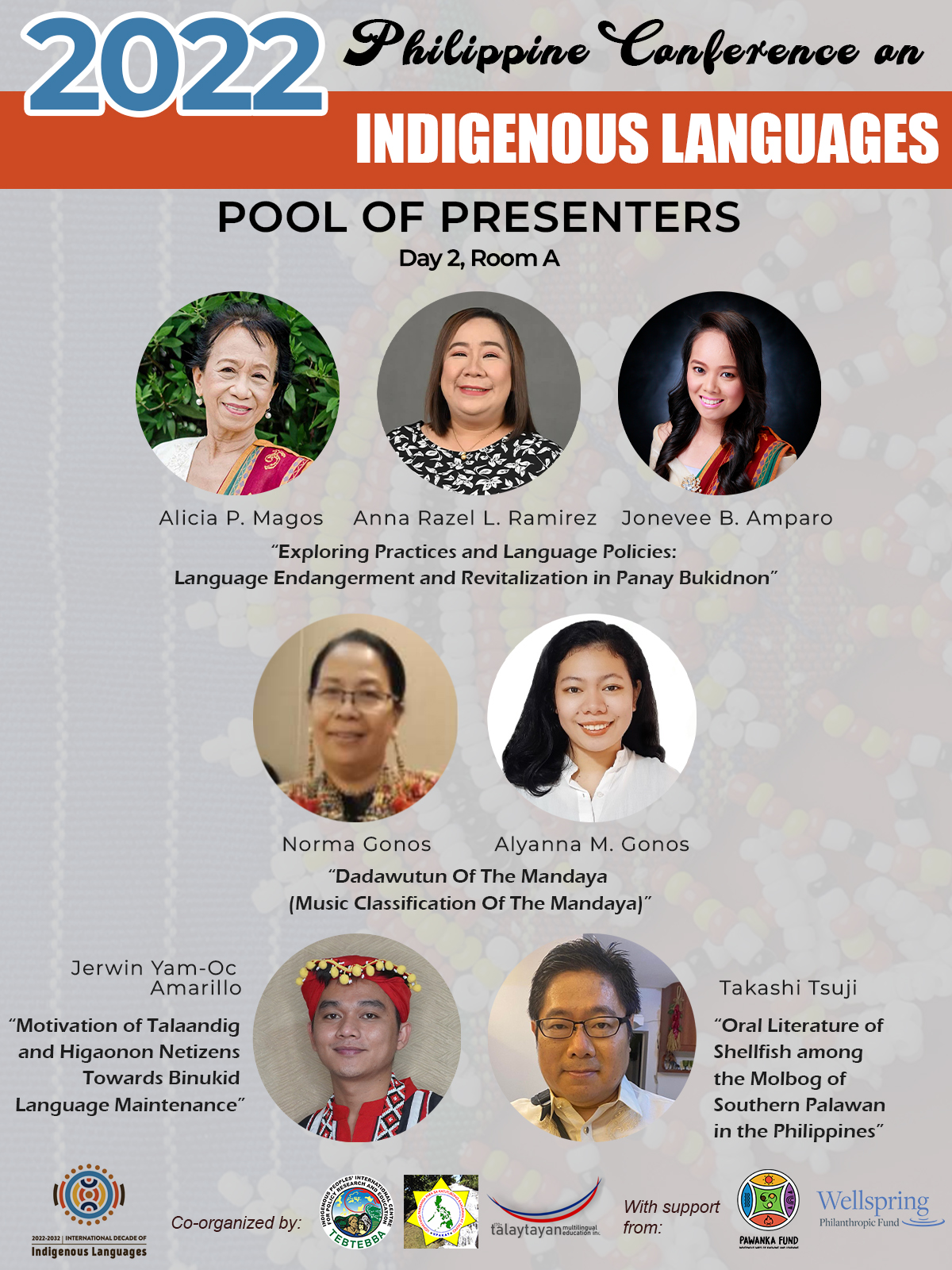
Meet the Room A presenters on October 26 for the contribution to the preservation and promotion of indigenous languages.
Alicia P. Magos, a socio-cultural anthropologist by profession and had spent almost 40 years of her life as a government employee, most of which as a researcher, professor and extension worker of the University of the Philippines Visayas in Iloilo. She also served as Director of the Center for West Visayan Studies (CWVS) for seven years and greatly helped in the CWVS mission as a Research Center and as repository of West Visayan cultural knowledge, making it perhaps as one of the richest depository of Visayan culture in the country.
Anna Razel L. Ramirez, a graduate of the University of the Philippines for her Bachelor's degree on Broadcast Communication and Community Development as well as her Master of Management in Rural Development Management, she has done extensive fieldwork in remote communities of Panay for indigenous knowledge research.
Jonevee B. Amparo completed her Bachelor of Secondary Education (Filipino) at West Visayas State University, and her Master of Arts (Filipino: Wika) at UP Diliman. Her research and public service are on language policy, language education, linguistic ethnography, and contextualization.
Jerwin Yam-Oc Amarillo, a grad student of Master of Arts in English Language Studies at Central Mindanao University. He is Talaandig by ethnicity, an indigenous group in the Province of Bukidnon, Mindanao. As a speaker of Binukid language, their heritage language, he plans to continue his efforts in investigating ethnic languages to be able to contribute to the revitalization of minority languages.
Takashi Tsuj, a Japanese ecological anthropologist and senior regional geographer researching mainly in the Philippines, Lao PDR, Indonesia of Southeast Asia, and Ryukyu in Japan. He currently works as a researcher at the Graduate School of Agriculture, Saga University, Japan, and as an administrative assistant for the National Museum of Ethnology, Japan.
Norma Gonos, a full-blooded Mandaya from Caraga, Davao Oriental, Philippines. As part of the group who helped conceptualize Apo Governance and Indigenous Leadership Academy (AGILA), she was asked to take the lead as its Executive Director in 2015 to present.
Masayag Alyanna M. Gonos, a full-blooded Mandaya from Caraga, Davao Oriental. She finished International Studies in 2022 from Ateneo de Davao University and had been involved in socio-political events lobbying for the basic human rights of the Filipinos.
5:00 End of Session for the 2nd Day
5:15-7:00 Cultural Night/Dinner
Day 3, October 27, Thursday
Morning Session
7:00-8:00 Breakfast
8:00-8:15 Summary of the 2nd Day’s Session
8:15-12:00 Lakbay-aral (National Museum)
12:00-1:20 Lunch
Afternoon Session
1:20-2:00 Organizational and planning meeting
2:00-3:00 Discussion of draft Manila IDIL declaration
3:00-3:20 Coffee Break
3:20-4:00 Finalization/Signing of Manila IDIL declaration
4:00-5:00 Photo opportunity
5:00 End of Meeting
With support from: 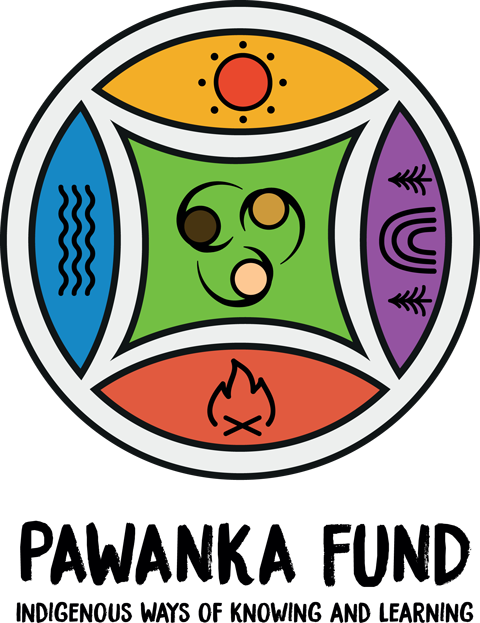 and
and 


